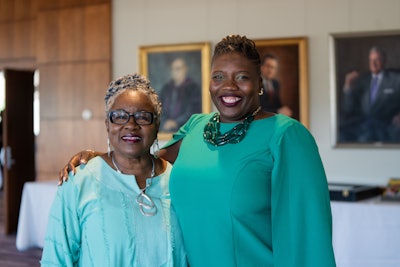Dr. Joanne V. Gabbin, the founder and executive director of the Furious Flower Poetry Center, the nation’s first academic center for Black poetry, retired in June after 28 years. She also steps down after 37 years on the faculty of James Madison University (JMU), Furious Flower’s home. Dr. Joanne V. Gabbin (left), the founder and executive director of the Furious Flower Poetry Center at James Madison University, pictured with Lauren Alleyne, who succeeds her as executive director of Furious Flower, the nation's first academic center for Black poetry.James Madison University
Dr. Joanne V. Gabbin (left), the founder and executive director of the Furious Flower Poetry Center at James Madison University, pictured with Lauren Alleyne, who succeeds her as executive director of Furious Flower, the nation's first academic center for Black poetry.James Madison University
Gabbin’s vision for a campus reading by poet Gwendolyn Brooks, the first African American to win the Pulitzer Prize for poetry, morphed into what is considered the largest gathering of African American poets and critics in the world. She named the 1994 conference that honored Black poetry’s matriarch, Furious Flower, based on a line of poetry in the poem Brooks wrote titled “The Second Sermon on the Warpland.” Rita Dove, the Henry Hoyns Professor of Creative Writing at the University of Virginia and a Pulitzer Prize-winning poet, read her work during that inaugural conference. Dove called that event “legendary.”
Following the second successful conference Gabbin organized in 2004, Furious Flower was chartered as an academic center at JMU.
More than two decades later, Gabbin’s leadership has made the Furious Flower Poetry Center “a big deal in the Black poetry world and for James Madison University,” said Dr. Malin Pereira, chairman of the Furious Flower advisory board, during JMU’s recent retirement celebration for Gabbin. Furious Flower has been “a key contributor to the explosion of Black poetry and scholarship since the 1980s,” added Pereira, who is also a dean and English professor at the University of North Carolina at Charlotte.
That historic gathering, Gabbin told Diverse, was a catalyst for Black poetry workshops and organizations like Cave Canem, which poets Cornelius Eady and Toi Derricotte formed in 1996 “to remedy the under‐representation and isolation of African American poets in the literary landscape,” and its offshoot, The Watering Hole, a southern-based vanguard for Black and other writers of color.
For Gabbin, the spark she ignited a quarter of a century ago with the Furious Flower Conference still burns bright.
“I'll never forget Elizabeth Alexander who was just slightly older than the youngest poet at the first Furious Flower Conference," said Gabbin. "She was still in the beginning of her career as a poet. This woman went on to become the inaugural poet for the first Black president of the United States, Barack Obama, and now she is the president of the Andrew Mellon Foundation."
“These poets have taken Black poetry from the margins of American literature to the very center of humanities in all kinds of ways,” she continued. “So, if I accomplished just that one thing, I would say my career was fulfilled.”
On the campus of a majority white university, Gabbin made JMU a destination “where Black professionals, writers, professors, speakers and change-makers can come and be heard. I don’t think that atmosphere would have happened without her presence here,” said Lauren Alleyne, who succeeds Gabbin as executive director of the Furious Flower Poetry Center. Alleyne, a JMU professor and poet, was the center’s assistant director for six years.
Not only did Gabbin build Furious Flower, Alleyne added, she worked to ensure that the internationally known center would thrive and Black poetry would be accessible.
“Furious Flower intends to make educational materials, videos, and programs available that illuminate the field of Black poetry,” said Gabbin, who secured a $2 million grant earlier this year from the Andrew Mellon Foundation to establish a secure digital framework for the Furious Flower archive. “We want to preserve these materials, documents, and audio-visuals that tell the story of Black poetry in this country and the world so that succeeding generations of scholars and poets may access them.”
Gabbin said she also established an endowment for the Furious Flower Poetry Center.
“I will continue to see the flowering of this garden that I've planted," said Gabbin. "I am exceedingly happy that I can leave this wonderful center and this amazing opportunity in the hands of people who will treasure it, and who will develop it."















